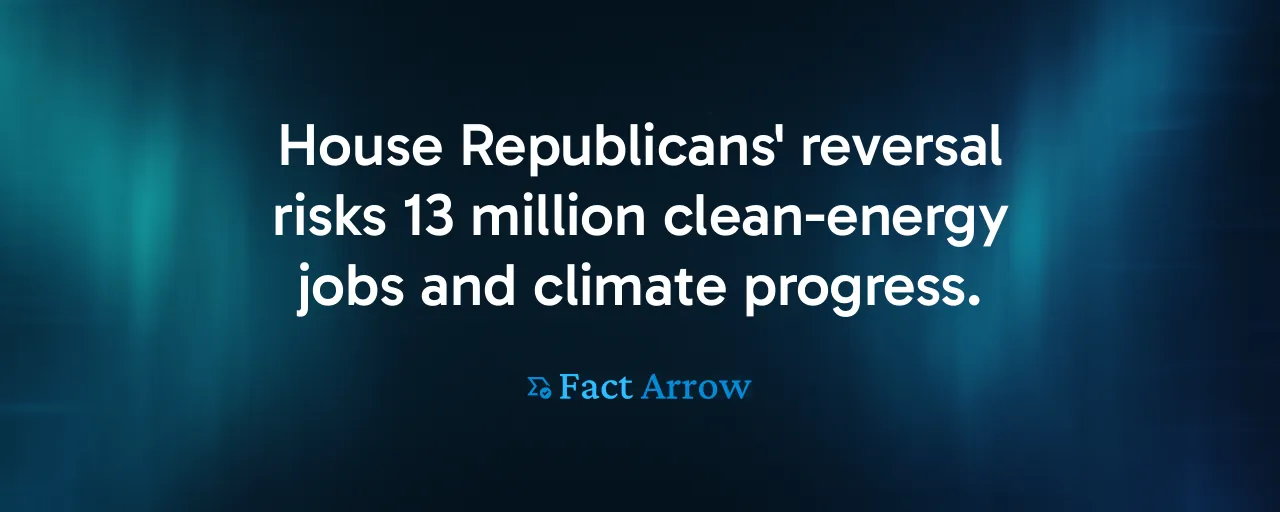A Betrayal of Economic Promise
Last summer, eighteen House Republicans urged Speaker Mike Johnson to protect the Inflation Reduction Act's clean-energy tax credits, citing billions in investments flooding their districts. These lawmakers, representing states like New York, California, and Georgia, saw factories for batteries, solar panels, and electric vehicles rising in their communities. In May 2025, every one of them voted for a tax package that guts those same incentives. This reversal represents a direct threat to the jobs, innovation, and climate progress the IRA has sparked across the country.
The IRA, passed in 2022, stands as the nation's boldest step toward a cleaner future. It has already driven over $400 billion in private investment, creating thousands of jobs in manufacturing and construction, many in Republican-led districts. These are tangible benefits. In places like Iowa and Nevada, workers are building solar farms and battery plants, fueled by tax credits that make such projects viable. The GOP's push to dismantle these incentives risks halting this momentum, leaving communities and workers in the lurch.
This issue impacts people directly. Families in rural counties are finding stable jobs in clean-energy sectors. Local governments are banking on tax revenue from new factories. Investors, trusting in stable policy, have poured capital into projects that could redefine American industry. The decision to slash the IRA's funding ignores these realities, prioritizing short-term political wins over long-term economic and environmental gains.
Jobs and Communities at Stake
The economic impact of repealing the IRA's clean-energy credits cannot be overstated. Analyses project the law could generate up to 13 million jobs by 2030, from construction workers in Arizona to engineers in Virginia. These are careers in industries poised to dominate the global economy. In Georgia, for instance, new plants for electric-vehicle components have brought thousands of jobs to areas hit hard by manufacturing decline. If the GOP's plan succeeds, many of these projects could stall, leaving workers without paychecks and towns without hope.
State and local leaders, regardless of party, have embraced the IRA's benefits. In Nebraska, officials celebrated a hydrogen-production facility that promised hundreds of jobs. In Utah, solar projects have boosted rural economies. These gains are now at risk. Repealing the credits could strand billions in private investment, forcing companies to abandon half-built factories or scale back operations. The ripple effects would hit small businesses, schools, and public services that depend on the economic activity these projects generate.
Beyond economics, the human cost is clear. Continued reliance on fossil fuels, unchecked by clean-energy growth, means worse air quality and higher healthcare costs. Communities near coal plants or refineries, often low-income or minority-led, face the brunt of pollution. The IRA's push for renewables offers a path to cleaner air and healthier lives. Undoing it would lock in those harms for another generation.
Climate Commitments in Jeopardy
The IRA functions as both an economic engine and a lifeline for America's climate goals. Experts estimate the law could cut greenhouse-gas emissions by 35 to 40 percent below 2005 levels by 2030, a critical step toward net-zero. This progress hinges on scaling up wind, solar, and hydrogen projects, all fueled by the IRA's incentives. If Congress dismantles these tools, the U.S. risks missing its targets, undermining global efforts to curb warming.
The international stakes are high. American leadership in clean technology strengthens its voice in climate negotiations. Countries like China are racing to dominate green industries, and the IRA has positioned the U.S. to compete. Repealing its credits would cede ground, letting competitors capture markets for batteries, turbines, and more. This issue extends beyond emissions, determining whether America will shape the future of energy or watch from the sidelines.
Public support for climate action is growing, even in conservative areas. Polls show voters in swing districts value clean-energy jobs and lower utility bills, both IRA outcomes. By voting to gut the law, House Republicans are ignoring their own constituents, who see the benefits of cheaper, cleaner power. This disconnect threatens the environment and the trust of communities counting on stable policy.
A Path to Protect Progress
The fight to save the IRA's clean-energy provisions isn't over. Democratic lawmakers, environmental groups, and labor unions are rallying to protect the law, urging bipartisan solutions. One option is grandfathering existing projects, ensuring factories and jobs already underway aren't derailed. Another is strengthening domestic-content rules, so credits prioritize American workers and materials, appealing to both parties.
Permitting reform could also bridge divides. Streamlining approvals for clean-energy projects and transmission lines would accelerate IRA benefits while addressing GOP calls for less red tape. Pairing these reforms with robust oversight to prevent waste could maintain public trust without gutting the law's core. These steps would preserve jobs, cut emissions, and keep America competitive.
The broader vision is clear: a future where clean energy powers communities, creates opportunity, and fights climate change. Bold action is required, not retreat. Policymakers need to listen to workers, businesses, and voters who see the IRA as a promise of progress. Anything less betrays the chance to build a stronger, cleaner America.
Looking Ahead With Resolve
The GOP's push to repeal the IRA's clean-energy credits represents a setback, though it is not the end of the effort. The law's impact, from bustling factories to falling emissions, shows what's possible when policy aligns with urgency. Defending it means standing up for workers, communities, and the planet, values that transcend politics.
Advocates are already mobilizing, from town halls in Iowa to boardrooms in California. They're reminding lawmakers that clean energy is a practical issue. Voters want jobs, affordable power, and a livable future. The IRA delivers all three, and its defenders need to make that case loudly and clearly.
America stands at a crossroads. The path forward demands courage to protect what's working and ambition to do more. The IRA's vision of a thriving, sustainable economy is worth fighting for, and the stakes, for workers, families, and the world, couldn't be higher.
